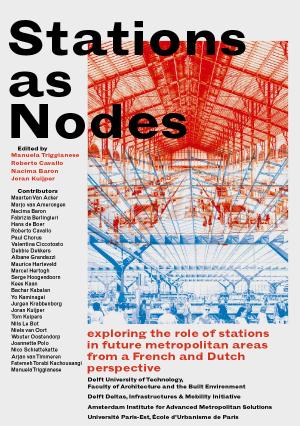Hosted by
Stations as Nodes: exploring the role of stations in future metropolitan areas from a French and Dutch perspective
Synopsis
At the main point of intersection between the railway and the city, stations are key elements in the organization of the intermodal transport as well as catalysts of urban developments in metropolises, medium and small cities. The focus of this publication is to explore the enrichment of a renewed approach of railway stations as intermodal nodes, therefore acting as breeding grounds for both urban and social developments.
This book has been initiated and built upon several activities currently running at the Amsterdam Institute for Advanced Metropolitan Solutions (AMS Institute), Delft University of Technology (DIMI, Delft Deltas Infrastructure Mobility Initiative and Department of Architecture of the Faculty of Architecture and the Built Environment) and University of Paris-Est (l’í‰cole d’Urbanisme de Paris). These activities have been framed within the context of two rapidly developing metropolitan areas: Randstad in the Netherlands and Mí©tropole du Grand Paris in the Ile de France. This volume forms the basis for a research on the ‘role of stations in future metropolitan areas’ with the ambition to link the two countries, learning from their different cities and distinct geographical context through comparable mobility challenges on the levels of the inner city, suburban and peripheral areas.
In line with these considerations, in 2018 AMS Institute, TU Delft/ DIMI and the Dutch Embassy in Paris with Atelier Ní©erlandais organized a successful workshop: ‘Stations of the Future’, in collaboration with La Fabrique de la Cití©. Together with Dutch and French planning entities, involving mass transit operators and railway companies, this workshop focused on several case studies in both metropolitan areas to understand the role of station hubs as intermodal nodes. During this joint French-Dutch event that took place in Paris, we spoke on topics like Station as intermodal node, Station as destination and Station as data center, including a debate on the relation between public space and architecture, densification and programming of station areas, pedestrian flows management and the integration of data.
Following the Paris workshop, the summer school ‘Integrated Mobility Challenges in Future Metropolitan Areas’ was organised by AMS Institute and Delft University of Technology/DIMI with the collaboration of the ARENA architectural research network, University of Paris-Est and the City of Amsterdam. This 8-day workshop extended the debate among international young professionals, academics and master students by looking at an important rail-metro node in the metropolitan area of the city Amsterdam: Sloterdijk Station — a crucial hub in a bigger urban area for mobility and exchange, and for urban growth. The main question was: which approaches and scenarios can be tested and applied to these intermodal nodes, particularly when dealing with lack of space and growing number of users? The results were four very different plans to improve the Sloterdijk Station area and to make the station a ‘future proof’ intermodal hub.
In this publication, invited experts from practice and knowledge institutes in France and the Netherlands share their common experience and draw on specific aspects and problems of conception, management and development of stations. A brief overview of the results of the two initiatives ‘Stations of the Future’ and the summer school ‘Integrated Mobility Challenges in Future Metropolitan Areas’ is here illustrated, accompanied by photo reportages of both events and by a curated reportage of the Amsterdam Sloterdijk station area.

